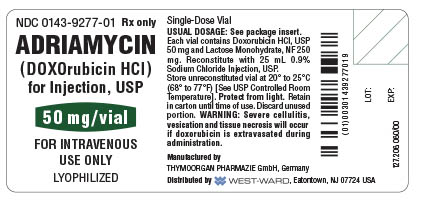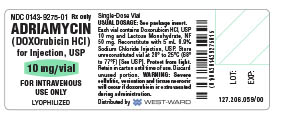
Adriamycin | Doxorubicin Hydrochloride Injection, Powder, Lyophilized, For Solution while Breastfeeding
What is Adriamycin | Doxorubicin Hydrochloride Injection, Powder, Lyophilized, For Solution ?
Can I use Adriamycin | Doxorubicin Hydrochloride Injection, Powder, Lyophilized, For Solution while breastfeeding?

8.3 Nursing Mothers Doxorubicin has been detected in the milk of at least one lactating patient [see Clinical Pharmacology (12.3)]. Because of the potential for serious adverse reactions in nursing infants from doxorubicin , a decision should be made whether to discontinue nursing or discontinue the drug, taking into account the importance of the drug to the mother.
Adriamycin | Doxorubicin Hydrochloride Injection, Powder, Lyophilized, For Solution Breastfeeding Analsys
Doxorubicin hydrochloride while Breastfeeding
DangerousCAS Number: 23214-92-8

Doxorubicin is a cytotoxic anthracycline antibiotic isolated from cultures of the caesium variety of Streptomyces peucetius. Doxorubicin and its active metabolite doxorubicinol are excreted in breast milk in significant amounts and with a very high milk/plasma ratio (Pistilli 2013, Egan 1985). There are two distinct pharmaceutical forms of doxorubicin, in the form of hydrochloride and in liposomal form, with very different pharmacokinetic profiles (Gabizon 2003). Given the variability in interindividual pharmacokinetics, potential pharmacokinetic changes with co-administration with other medication (EMA 2017, Swenson 2003) and their serious side effects (cardiotoxicity, myelotoxicity and liver toxicity) (Tacar 2013, Danesi 2002), it is prudent not to breastfeed during treatment. When possible, detection in the milk of each patient to determine the total elimination of the drug would be the best indicator for resuming breastfeeding between two rounds of chemotherapy. It is known via pharmacokinetics that after 3 elimination half-lives (T½) 87.5% of the drug is eliminated from the body; after 4 T½ 94%, after 5 T½ 96.9%, after 6 T½ 98.4% and after 7 T½ 99%. Plasma drug concentrations in the body are negligible after 7 T½. In general, a period of five half-lives may be considered a safe waiting period to return to breastfeeding (Anderson 2016). For doxorubicin in hydrochloride form, with a mean elimination half-life (T½) of 30 hours, authors recommend waiting 7 to 10 days (between 5, 6 and 8 T½) after the last dose to restart breastfeeding. Meanwhile, express and discard breast milk regularly (Hale 2017 p.210). For the liposomal form with a mean T ½ of 74 hours and a wide range, this is not applicable. Some chemotherapeutics with antibiotic effects may alter the composition of the microbiota (combination of bacteria or bacterial flora) of the milk and the concentration of some of its components (Urbaniak 2014). This possibly occurs briefly with later recovery, with no harmful effects being reported in breastfed infants.
Adriamycin | Doxorubicin Hydrochloride Injection, Powder, Lyophilized, For Solution Breastfeeding Analsys - 2
Doxorubicin hydrochloride while Breastfeeding
CAS Number: 23214-92-8
Most sources consider breastfeeding to be contraindicated during maternal antineoplastic drug therapy, especially anthracyclines such as doxorubicin.[1] It might be possible to breastfeed safely during intermittent therapy with an appropriate period of breastfeeding abstinence; however, the high levels and persistence of doxorubicinol in milk make defining an appropriate abstinence interval difficult. Chemotherapy may adversely affect the normal microbiome and chemical makeup of breastmilk.[2] Women who receive chemotherapy during pregnancy are more likely to have difficulty nursing their infant.

I am nursing mother and I have already used Adriamycin | Doxorubicin Hydrochloride Injection, Powder, Lyophilized, For Solution, what should I do?
You should immediately inform your health care provider about Adriamycin | Doxorubicin Hydrochloride Injection, Powder, Lyophilized, For Solution usage and your breastfeeding interval after usage of
My doctor has prescribed me Adriamycin | Doxorubicin Hydrochloride Injection, Powder, Lyophilized, For Solution, what should I do?
Please double check with your doctor if he is aware of your breastfeeding stratus, Ask your doctor if there is any safe alternative of Adriamycin | Doxorubicin Hydrochloride Injection, Powder, Lyophilized, For Solution. Check with your doctor if you shall temporally stop breastfeeding. You may go for second opinion as well. Still after all of this if your doctor still recommends Adriamycin | Doxorubicin Hydrochloride Injection, Powder, Lyophilized, For Solution then go for it as they have access on more detailed medical and scientific information and they understand your individual medical situation much better.
If I am using Adriamycin | Doxorubicin Hydrochloride Injection, Powder, Lyophilized, For Solution, will my baby need extra monitoring?
Extreme level of monitoring required as Adriamycin | Doxorubicin Hydrochloride Injection, Powder, Lyophilized, For Solution could be dangerous for kid.
Who can I talk to if I have questions about usage of Adriamycin | Doxorubicin Hydrochloride Injection, Powder, Lyophilized, For Solution in breastfeeding?
US
National Womens Health and Breastfeeding Helpline: 800-994-9662 (TDD 888-220-5446) 9 a.m. and 6 p.m. ET, Monday through Friday
UK
National Breastfeeding Helpline: 0300-100-0212 9.30am to 9.30pm, daily
Association of Breastfeeding Mothers: 0300-330-5453
La Leche League: 0345-120-2918
The Breastfeeding Network supporter line in Bengali and Sylheti: 0300-456-2421
National Childbirth Trust (NCT): 0300-330-0700
Australia
National Breastfeeding Helpline: 1800-686-268 24 hours a day, 7 days a week
Canada
Telehealth Ontario for breastfeeding: 1-866-797-0000 24 hours a day, 7 days a week
